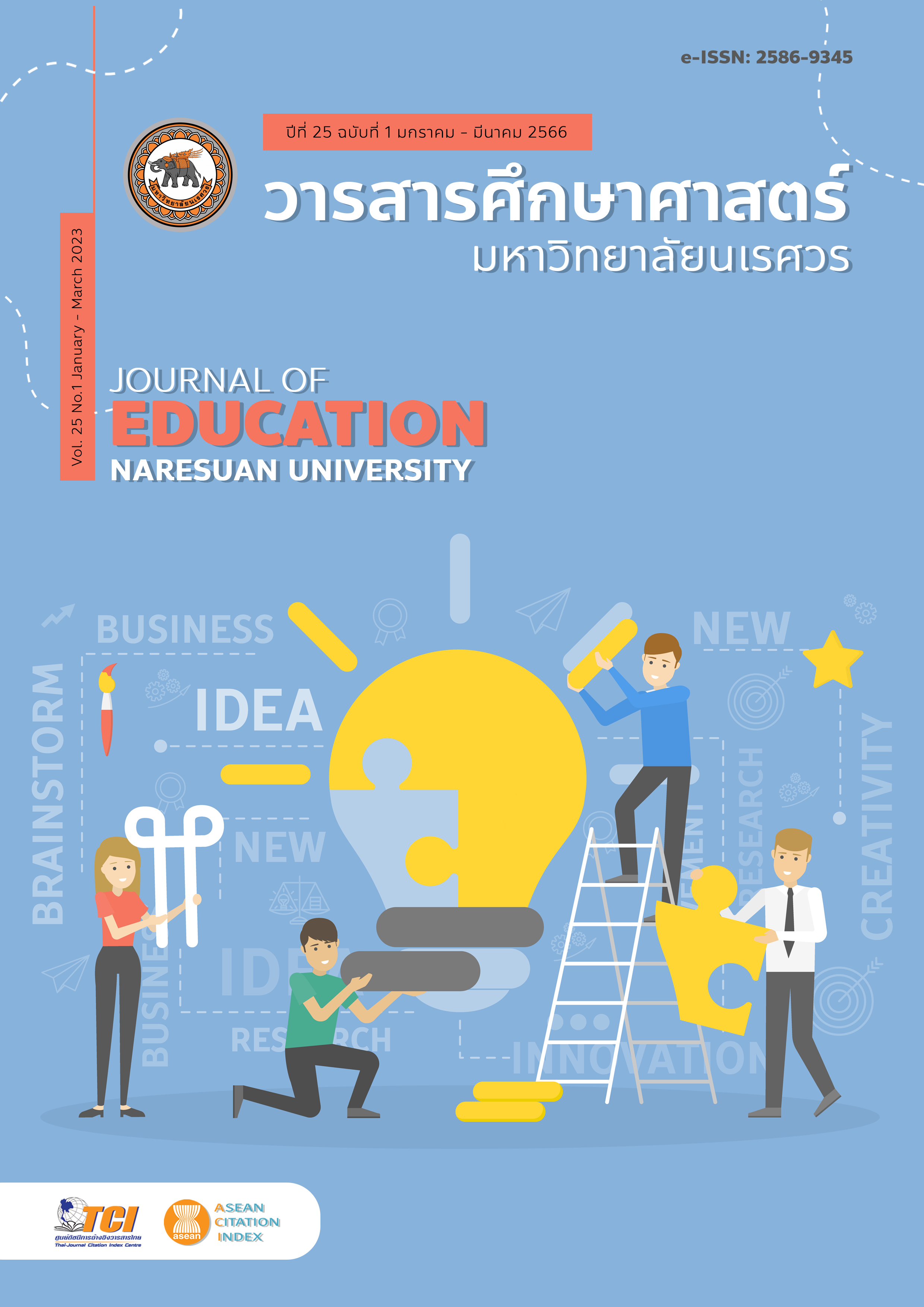TEACHERS’ COMPETENCIES IN LEARNING MANAGEMENT TO PROMOTE MATHEMATICAL LITERACY สมรรถนะครูด้านการจัดการเรียนรู้ที่ส่งเสริมการรู้เรื่องคณิตศาสตร์
Main Article Content
Abstract
Mathematical Literacy is an essential skill in the 21st century due to its importance in the application of mathematics in real-life contexts. People who are able to solve the problem effectively need to have ability to think, interpret, and make decisions about mathematics problems in real-life situations. Mathematical literacy can be enhance through the learning implementation since the elementary level. Nonetheless, teachers play an important role in enhancing students’ mathematical literacy skills. Therefore, this article proposed teachers’ competencies in learning implementation to enhance mathematical literacy in elementary school. These competencies consisted of 5 components: 1) the knowledge of mathematical literacy content 2) the knowledge of teaching mathematical literacy 3) the ability to design learning management that promoted mathematical literacy 4) the ability to implement learning management that promoted mathematical literacy and 5) the attributes in teaching development. All five components were important guidelines for the development of mathematics teachers ’competencies learning implementation to enhance students’ mathematical literacy.
Article Details

This work is licensed under a Creative Commons Attribution-NonCommercial-NoDerivatives 4.0 International License.
The owner of the article does not copy or violate any of its copyright. If any copyright infringement occurs or prosecution, in any case, the Editorial Board is not involved in all the rights to the owner of the article to be performed.
References
Bansilal, S. (2014). Exploring the notion of mathematical literacy teacher knowledge. South African Journal of Higher Education, 28(4), 1156-1172.
Bansilal, S., Webb, L., & James, A. (2015). Teacher training for mathematical literacy: A case study taking the past into the future. South African Journal of Education, 35(1), 1-10.
Boonmaton, R., Supap, W., Wiriyapong, R. (2018). The development of grade 11 students’ mathematical literacy on probability using context-based learning. Academic Services Journal, Prince of Songkla University, 29(2), 51-61. [in Thai]
De Lange, J. (2003). Mathematics for literacy. Quantitative literacy: Why numeracy matters for schools and colleges. Retrieved March 15, 2020, from https://www.maa.org/external_archive/QL/pgs75_89.pdf
Densatan, A., Champachaisri, K., Kitkuekool, S. (2015). Effective of learning management by 5E learning cycle model integrated with metacognition process to encourage mathematics literacy in ratios and percentages for mathayomsuksa 1 students. In The 3rd National Academic Conference (pp. 125-135). Ubon Ratchathani: The Eastern University of Management and Technology. [in Thai]
Kaiser, G., & Willander, T. (2005). Development of mathematical literacy: Results of an empirical study. An International Journal of the IMA, 24(2/3), 48-60.
Makhanong, A. (2015). Mathematics for high school teachers. Bangkok: Chulalongkorn University Press. [in Thai]
Nel, B. (2012). Transformation of teacher identity through a mathematical literacy re-skilling programme. South African Journal of Education, 32(2), 144-154.
OECD. (2016). PISA 2015 Assessment and Analytical Framework: Science, Reading, Mathematic and Financial Literacy. Retrieved May 26, 2021, from http://dx.doi.org/10.1787/9789264255425-en
Ojose, B. (2011). Mathematics literacy: Are we able to put the mathematics we learn into everyday use?. Journal of Mathematics Education, 4(1), 89-100.
Patamavipat, S. (2014, May). Assessment of mathematical literacy of PISA 2015. IPST Megazine, 42(188), 35-39. [in Thai]
The Institute for the Promotion of Teaching Science and Technology. (2011). PISA 2009 Assessment Framework. Bangkok: Arun Publications. [in Thai]
Sumirattana, S., Makanong, A., & Thipkong, S. (2017). Using realistic mathematics education and the DAPIC problem-solving process to enhance secondary school students' mathematical literacy. Kasetsart Journal of Social Sciences, 38(3), 307-315. [in Thai]
The Institute for the Promotion of Teaching Science and Technology. (2020). PISA 2021 and Mathematical literacy assessment: Focus on PISA. Retrieved May 10, 2021, from https://pisathailand.ipst.ac.th/issue-2020-53 [in Thai]
The Institute for the Promotion of Teaching Science and Technology. (2020). PISA 2018: Global Competence. Retrieved May 12, 2021, from https://pisathailand.ipst.ac.th/news-15/. [in Thai]
Tinprapha, T. (2014). Mathematical literacy: A necessary skill in the 21st century. IPST Magazine, 42(187), 23-26. [in Thai]
Venkat, H. (2010). Exploring the nature and coherence of mathematical work in South African Mathematical literacy classrooms. Research in Mathematics Education, 12(1), 53-68.


